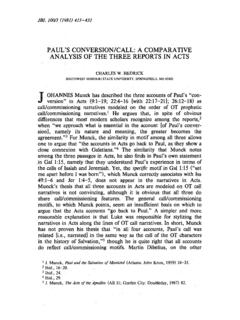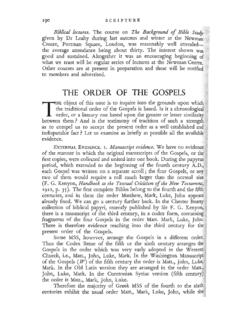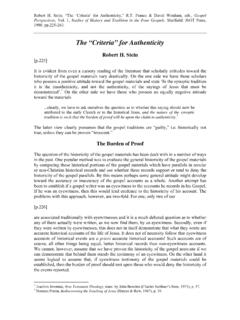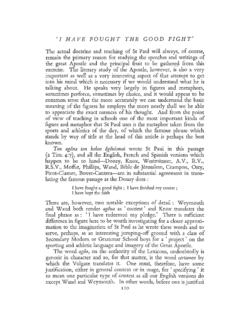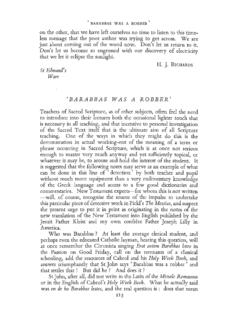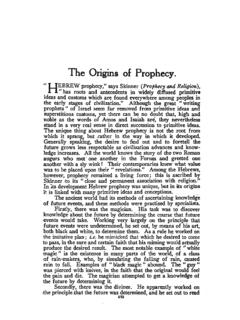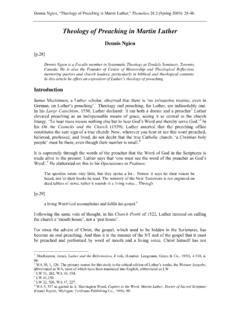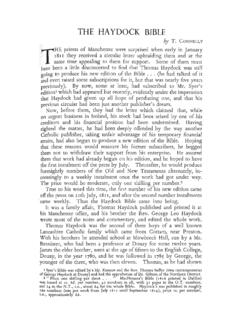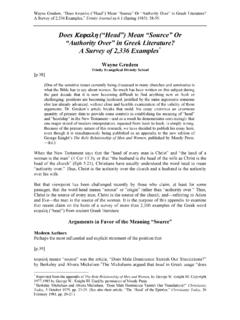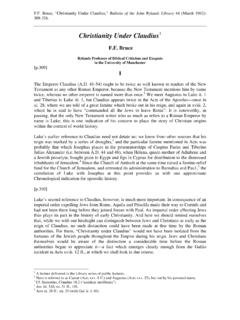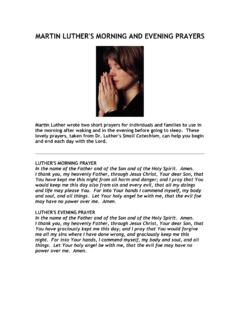Transcription of The Morning and Evening Sacrifice: A Sacrifice of Praise ...
1 Ashland Theological lournal34 (2002) The Morning and Evening Sacrifice : A Sacrifice of Praise through the Psalms By Walter Hampel* The Need for Memory Every nation must have a collective memory if it is to survive. Memory is the re of its history. Even though no living Americans have personal memory of President !orge Washington, we still remember him as our first president. Without a national !mory, we would soon forget what it means to be American. Memory serves us individually as well. It roots us to our community, family d even ourselves. It is not uncommon to find family photographs on our desks at work stuffed inside a wallet. We do this not because we cannot remember these loved ones such photographs. Rather, we do it because the photos serve as a periodic Iminder during the day of those who love us and of our life beyond the confines of ork.
2 Christians need memory too. Without it, we begin to forget the One who loves , and died for us. The world has a way of trying to force its attention and its priorities to our daily lives. David Wells likens the world's influence on us to a constant mnding. He writes that such a pounding is made up of the pressures, demands, and expectations of our modern culture that combine to deliver the message that we must belong to it, not simply in the sense that we must live in it, but rather that we must live by it. I (Emphasis added) This threat is not a new one. Throughout church history, Christians have found lrious ways of fulfilling the command to "remember Jesus Christ, raised from the !ad, descended fro~ David.,,2. Numerous devotional practices have developed as hristians have sought to keep their minds on heavenly things rather than on the things ~ this Walter Hampel (MA, ATS) is a teacher at Troy Christian Chapel in Troy, Michigan 1 The Morning qnd Evening Sacrifice : A Sacrifice of Praise Through the Psalms Christians throughout the centuries have used various means of rememberi: God on a frequent basis.
3 In many cultures, roadside "pilgrim crosses" were set up~' reminders of Christ and to serve as sites for travelers' prayers. These crosses acted a "thread of memory" which connected the traveler to Christ. There are two special "threads of memory" which can keep us connected'l) Christ. These threads have been used for millennia by those faithful to God. Wh woven together, these threads provide a time-tested pattern for communing with ChIi, and keeping Him in our memory. The First Thread - A Timely Sacrifice When God was preparing His people Israel to enter the Promised Land \' Canaan, the LORD gave specific commands to Moses concerning the rituals of worsl which He wanted of His people. Among the many requirements given to Moses, G commanded a twice-daily Sacrifice .
4 He commanded the daily Sacrifice of "two lamb!' year old. Offer one in the Morning and the other at twilight." 4 This set in place t pattern for the Morning and Evening Sacrifice . Over the next several centuries, the worship of God was centered in the Tent" Meeting described in Exodus 25-27. After King David made Jerusalem the capital ' the nation, he desired to build God a permanent house to replace the Tent ?f Meetir God told David that his son Solomon was the one to build the Temple. Yet, David VY allowed to make plans and provisions for that future House of God. One of t ,: provisions required a change of priestly functions for the Levites. Since the Levit would no longer need to take down and set up the Tent of Meeting, God, throu; David, gave them a new assignment.
5 The Levites were now to stand every Morning to thank and Praise the LORD. They were to do the same in the The Morning and Evening Sacrifice was beginning to take on a devotional character. As Israel's history progressed, the devotional component of the Morning ai Evening Sacrifice grew. Prayer was now being likened to the Evening Sacrifice . T Psalmist writes in Psalm : 2 Ashland Theological lournal34 (2002) May my prayer be set before you like incense; may the lifting up of my hands be like the Evening Sacrifice . The twice-daily sacrifices also had become time-markers for the people of I ael. In Elijah's confrontation with the prophets of Baal, the writer of 1 Kings ilicates that Elijah's Sacrifice to God occurred at the "time for the Evening Sacrifice .,,6 hring the Babylonian Captivity, with the Temple in Jerusalem in ruins and all but a IN of the inhabitants either dead or deported, Daniel offers a prayer to God and [;eives an answer from the angel Gabriel "about the time of the Evening Sacrifice .]
6 " 7 Iren after the period of exile in Babylon, the writer of the book of Ezra points out that Lra ends an hours-long period of abasement before the Lord and begins a prayer of I~nfession for the sin of his people "at the time of Evening Sacrifice ."g Enter the Church The Church further developed the practice of a Morning and Evening Sacrifice . nce Christ's death was the ultimate, once-for-all, and perfect Sacrifice , the original orning and Evening Sacrifice of a lamb would no longer be necessary or even 'propriate. Yet, the Scriptures call us to a continual Sacrifice . It is not a bloody animal crifice or an offering of grain or wine. We are called to a Sacrifice of Praise . The iter of Hebrews reminds us that Through Jesus, therefore, let us continually offer to God a Sacrifice of Praise -the fruit of lips that confess his name.
7 9 Early in Church history, Christians continued the pattern of prayer and Praise arted by their Old Testament counterparts. Not only did Morning and Evening prayer mtinue but additional times of prayer developed as well. Using Psalm 119:164 as its landate ("Seven times a day I Praise you for your righteous laws"), Christians :!veloped fixed-time prayer with up to seven times a day specified as special hours of rayer. Standardized formats and fixed times for prayer arose early in church history. he Didache, a manual for church practice, dating to the late 1st or early 2nd century, ~garded the Lord's Prayer as a fixed format prayer to be said continually by the hristian faithful. It instructs its readers to pray the Lord's Prayer and to "Say this rayer three times every day.
8 ,,10 Early church fathers such as Clement of Alexandria 3 The Morning and Evening Sacrifice : A Sacrifice of Praise Through the Psalms i (c . ) and Tertullian ( ) suggested the use of fixed times of pra! throughout the dayY . Hippolytus, writing around AD 217, recommended seven specific times" daily prayer. The first is upon waking in the Morning . The second at 9 The thinl noon. The fourth at 3 The fifth at bedtime. The sixth at midnight. The seventh i: dawn. He used several biblical texts as patterns for these set times of prayer. He wn that the reason for a 9 time of prayer, for example, is that it was "at that he! Christ was nailed to the tree." 12 John Chrysostom, writing in AD 388, urged believers in Christ to set asidl time of prayer in church at dawn, before going to work.
9 This would be a time to th,i God and "make your prayers and confessions to the God of all things.,,13 Likewise,1 instructs the Christian that at Evening , he should return here to the church, [and] render an account to the Master of his whole day and beg forgiveness for his falls. 14 Corporate Morning and Evening prayer was finding expression in places Sl as Jerusalem. In AD 384, a Spanish traveler named Egeria wrote a detailed account: her pilgrimage to Jerusalem. In this account, she noted that prayer services were da held at the site of the Lord's resurrection. These services were no small gatherin Starting before dawn, the monks, virgins and some lay persons met for hymns, prayl and psalms until sunrise. There were also services at noon, 3 , and the even; "Lucernare" at the time of the lighting of the lamps at 4 at which time furt!
10 Prayers, hymns and psalms were offered until The monastic movement continued this practice with the development of se, "canonical" (ordered by church rule) hours. These hours roughly correspond Hippolytus' hours. They are Matins & Lauds (dawn), Prime (6 ) Terce (9 ) SI (Noon), None (3 ), Vespers (Sunset) and Compline (night). In observance of th~ hours, the clergy were required to recite the Divine Office, "a complicated set of pray that changed every day.,,16 These prayers consisted of various hymns, passages fTi Scripture and the Psalms with specific readings found in a book called the Breviary. 4 Ashland Theological lournal34 (2002) During the middle ages, it was not uncommon to have the Morning and Evening , yers sung in church. In England, these services were open to both the laity and the : rgy.
